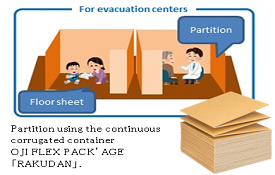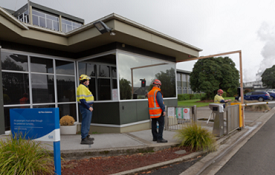We would like to extend our sincere condolences to those who have lost their lives due to the COVID-19 and their families, and express our heartfelt sympathies to everyone who has contracted and is fighting the disease. We also would like to express our deep respect to medical health experts and the members of the government who are struggling every day to prevent the spread of the outbreak and maintain social infrastructure.
The Oji Group produces a variety of products essential for daily life, such as tissue paper, toilet rolls, face masks, non-woven fabrics and other hygiene materials, corrugated containers to support logistics services, folding carton products, and newsprint to communicate information. Amid the severe coronavirus crisis, we continue to engage in day-to-day production activities, while rigidly implementing anti-infection measures following local government orders, so that we can continue supplying these essential products. Back office personnel in our global affiliates work from home, attend workplaces in rotation and commute outside peak hours to accomplish their day-to-day duties while hugely reducing their opportunities for physically contacting people. We are united as one facing this unprecedented difficulty.
Businesses have responsibilities to the entire society. They do not simply conduct economic activities, but live together with society and have responsibilities to people living in it. The coronavirus crisis has no precedent in terms of the scale and expanse of its impact and neither businesses nor individuals are immune to it. While we feel gratitude for the actions taken by medical experts, to resolve the issues facing them, we have decided the new installation of face mask production facilities and increased production of the non-woven fabric that medical isolation gowns are made of. We strive to meet social demands by continuously making good use of the expertise of the Oji Group.
Hiroyuki Isono
Representative Director of the Board
President and Group CEO
Oji Holdings Corporation
We have decided to strengthen our production capacity and supply non-woven fabric with excellent water repellency, that is produced as a base material for paper diapers, to be used for 800,000 surgical isolation gowns per month. Also, we have decided to release face masks that is produced by New Tac Kasei, our affiliate, by installing mask production facilities (capacity: 2M masks/month) within the existing clean room in Yamamoto Mill of New Tac Kasei to help respond to the nationwide shortage of face masks. We will continuously strive to contribute to a quick end to the spread of COVID-19.

Amid the spread of the COVID-19 coronavirus, the ceremony for new employees was held by widening of intervals between seats. Those who returned from overseas in March stayed home and watched a live stream of the ceremony. Training commenced the following day, with all the new employees engaging in e-learning and receiving lectures and training over the web conferencing platform.

The Oji Container Group has provided various corrugated container products, such as corrugated container beds, to evacuation centers, etc. for earthquakes, heavy rains, typhoons, and other natural disasters. To protect against the spread of coronavirus infection, demands for partitions are increasing, and we are proposing solutions to national and local governments. Internally, each administrative dept. is taking measures to prevent infection utilizing corrugated containers.

While never stopping operations is the top priority, the Kanzaki Mill of Oji Imaging Media has been taking various measures to stop the virus from being brought in from outside. They include disinfectants at its main gate, at the office, at the cafeteria and at the visitor entrance and a trial installation of a thermography system at the main gate. In addition, We also implements other measures to stop the spread of infection, with a focus on physical distancing, such as enabling employees to work from home, reducing the density of back office staff by using of idle spaces in meeting and other rooms, halving the number of seats in the cafeteria to prevent staff from sitting face-to-face, the allocation of time slots for lunch to different sections. As an action unique to us to avoid close contact, we have produced partitions between seats from the film material waste generated by the shop floor to prevent face-to-face contact.

We discussed what we could do as a printing business operator to support the restaurants facing hard times in the current situation, where consumers refrain from going out to eat. We created a poster that shows people at a glance that the restaurant displaying it offers takeout services, and distributed copies of it free to the restaurants who desire it. To make it convenient to use, we created posters, point-of-sale displays and flyers in different sizes. The poster displays a QR code that links to a special website with a list of the restaurants displaying the poster. It provides a connection from a paper medium to the online media to support these restaurants.

In Malaysia, the COVID-19 lockdown order has been in force since mid-March. This fully stopped non-essential business activities. GSPP once stopped its operations at all the plants in Malaysia, and restarted limited to essential businesses for daily needs. However, operations are still tightly restricted. In this situation, we are working as one to fulfill our social mission, providing containerboard and corrugated containers.

Malaysia has been locked down since mid-March. Our company is reducing the number of employees working on-site by promoting telework, web conferences, etc., and is frequently sterilizing workplaces and maintaining social distancing between workers. Making the prevention of COVID-19 infections our top priority, all our staff confront the coronavirus fully in their efforts to deliver as many Genki! disposable diapers as possible to the babies of Southwest Asia.

We have created internal groups using SNS and is asking employees to report their health condition by a predetermined time through the SNSso that we can understand and share the health condition of all employees. In our country, where, compared to other countries, an adequate medical environment is not established, "Do not get infected," and "If infected, minimize secondary infections by reporting the infection immediately" are extremely important key phrases. All employees continue to keep their spirits up in the face of the pandemic, and are working toward the continuation of our business.

In India, the world's largest nation-wide lockdown had been in force, extended twice since March 25. Our company is continuing to operate with the minimum number of workers to produce corrugated containers for essential products such as medicines, medical supplies, and foods at two out of three plants in the north and west areas. During operations, the health and safety of employees is the highest priority, and we take special care to prevent infection by maintaining social distancing during work, checking the temperatures of the people who enter our premises, supplying masks, sterilizing the workplaces, and other measures.

A state of emergency was declared in Thailand on March 26 and all stores excluding those dealing with essential items have since been closed. Since early March, we have been strictly checking the temperatures of those entering the premises and ordering them to wear masks, even though the outdoor temperature is around 40 ℃. We introduce additional anti-infection measures as necessary, and ensure that they are known and followed by all concerned. Besides, we revise work flows, advise staff at the Bangkok Office to work from home and conduct meetings online to continue our business operations without delays.

The Vietnamese government restricted entry to the country in mid-February and locked down cities in late March. Though plants were allowed to continue operations regardless of business category, 10 strict restrictions (each restriction evaluated on a scale of 1 to 10 points, for a total of 100 points), including a limitation on the number of workers per square meter, were enacted as conditions for continuing operations. Therefore, we must fall below the maximum score allowing plants to continue operating. Fortunately, with the cooperation of all employees, we successfully passed the audit and are able to continue operating stably.

We were able to successfully resume operations on 28th April by taking full advantage of WEB conference system to conduct conferences (around 1,400 times) and internal meetings (around 2,200 times). Every week during the lockdown, messages from the CEO were sent to employees every week to share the status of Pan Pac, as well as points to be aware of in mind and body health while waiting at home as newsletter.

New Zealand and Australia were in lockdown for 34 days since March 25. We were deemed an ‘essential service’ and allowed to continue, except for Tasman and Penrose Mills that shut during the lockdown. Operating procedures at all sites were adjusted for physical distancing and hygiene measures. Visitor screening and contact tracing processes were established and desk-based staff started working from home. COVID-19 risks remain but we will continue to adapt to keep our people safe and fulfill our social responsibilities.

As the news about the COVID-19 coronavirus overwhelms us, it is now very common to see people wearing face masks in the United States, which used to be rare. Amidst this, our company introduced an infrared thermography system to check people’s temperatures before they enter the premises so that employees and others who have fevers would be prevented from entering. We hope that the United States will be back to normal very soon, without people wearing masks on the street as soon as possible.

We have been designated essential while confirmed cases have been increasing in Brazil. We cover a broad range of businesses including pulp manufacturing, managing 250k ha forests and running a port for exporting products, which means once the virus is widespread, our operations are forced to halt. Under a slogan “Asseguramos a saúde e a segurança na CENIBRA mesmo com COVID-19 (We ensure health and safety at CENIBRA even with COVID-19”), we’ve been daily working on the infection prevention by expanding working from home, having web conferences, twice-daily temperature checks and spraying the site. People don’t usually wear masks here but all employees now wear masks thanks to awareness campaigns conducted and share a sense of crisis companywide. You can also watch the video clip at https://www.youtube.com/watch?v=xMXPpVk-O9M&feature=emb_title

An important rule to effectively protect employees from the risk of infection during their work is the strict requirement to keep always at least 1,5 m distance to other persons. Same refers to the observance of hygiene regulations such as regular and correct hand washing. Disinfection dispensers have been set up in all area and a team of cleaning staff regularly disinfects door handles, control panels etc. Workplaces have been separated including home office. Meetings are held via WEB conferencing tools, visitors to KANZAN including mill tours have been suspended, change of shifts are done without any contact. The President himself makes regular statements in order to strengthen the employees’ morale.
